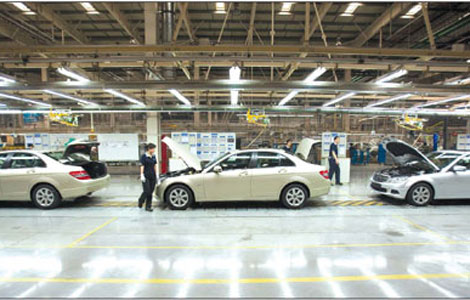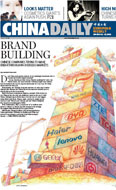Asia
Global supply chain rattled by Japan quake, tsunami
Updated: 2011-03-14 16:31
(Agencies)
 |
|
Pedestrians are reflected in a screen displaying the stock index prices in Tokyo March 14, 2011. Japan's Nikkei average extended losses and fell 3.9 percent to 9,851.06 in early trade on Monday as the market gauges the effects of last week's earthquake and tsunami. REUTERS |
Global companies from semiconductor makers to shipbuilders faced disruptions to operations after the earthquake and tsunami in Japan destroyed vital infrastructure and knocked out factories producing everything from high-tech components to steel.
Thousands of people have been killed and millions have been left without water, electricity, homes or heat after Friday's 8.9 magnitude quake triggered a massive tsunami which tore across a wide swathe of coastline north of Tokyo.
The earthquake has forced many firms to suspend production and shares in some of Japan's biggest companies tumbled on Monday, with Toyota Corp and Sony Corp falling 8 percent and 9 percent, respectively.
With initial damage assessments still being made, companies and analysts said it was too early to accurately gauge how long disruptions might last.
"It will take quite some time until investors' confidence in Japanese manufacturers returns. When we look back at the Kobe earthquake, it took about a week to get an overall picture of the magnitude of the damage," said Toshihiko Matsuno, senior strategist at SMBC Friend Securities, referring to the 1995 earthquake that killed more than 6,400 people.
"At this point, it's absolutely unclear how the power cut will affect manufacturers' production and businesses. "
Rolling power blackouts are likely to affect Tokyo and surrounding areas over the next few weeks, adding to the existing challenge of inspecting and repairing north Japan plants amid continuing aftershocks and the threat of major radiation leaks from damaged nuclear power plants.
KOREAN COMPANIES HIT
Japan is a major electronics manufacturer, accounting for 14 percent of the global production of computers, consumer electronics and communications gear last year, according to research consultancy IHS iSuppli.
Companies in neighbouring South Korea, which depend heavily on Japan supplies such as LCD glass, chip equipment, silicon wafers and other products to produce semiconductors, were some of the most affected.
Hynix Semiconductor , the world's No.2 memory chipmaker and a rival of Japan's quake-hit Toshiba Corp and Elpida Memory , said it was concerned the quake may weaken consumer demand further and disrupt supplies of chip components.
"It could give a boost to battered chip prices but that's a short-term impact from disrupted supplies by Japanese companies," said Kim Min-chul, chief financial officer at Hynix. "Longer-term we are more concerned about the quake reducing overall consumer demand and disrupting supplies of chip components and equipment, which could interrupt our production as well."
Hynix shares surged almost 9 percent on expectations of a short-term boost to chip prices, while shares in Toshiba, a conglomerate whose products include semiconductors and nuclear reactors, dived 16 percent.
Toshiba, which supplies more than a third of the NAND memory chips used worldwide in devices such as Apple's hot-selling iPad, said it was starting the process of restarting a chip factory in Iwate, northern Japan.
Japan's Shin-Etsu , the world's top producer of silicon wafers used to make semiconductors and the plastic PVC, suspended operations at its Shirakawa plant over the weekend.
"We see a strong possibility that it may be some time before operations resume," analysts at Nomura said in a note.
"As this plant accounts for just over half of Japan's production of 300mm wafers for semiconductors, a protracted stoppage could have a substantial impact on the semiconductor industry."
Shares of Shin-Etsu fell 6.7 percent in Tokyo, while rival silicon wafter makers Sumco Corp ended flat in a Tokyo market that closed down 6.2 percent.
Spot prices for DRAM chips, mostly used in personal computers (PC), had started rising in China, chip price tracker DRAMExChange said.
"Especially for PC and system manufactures, they need to be more proactive in DRAM inventory for the upcoming peak season," it said in a note.
STEEL, SOLAR
Companies reliant on Japanese steel such as South Korean shipbuilders were also expected to face supply constraints or higher prices due to disruptions caused by the quake and its aftermath.
South Korea houses the world's top three shipbuilders -- Hyundai Heavy Industries , Daewoo Shipbuilding and Marine and Samsung Heavy Industries .
"The earthquake has reportedly affected around 20 percent of the Japanese steel production capacity," said Kim Hyun-tae, an analyst at Hyundai Securities in Seoul. "It will disrupt production in Japan, one of the major steel producers exporting 40 percent of its output. In contrast, steel demand will rise for damage restoration."
Nippon Steel Corp , the world's No.4 steelmaker, said on Sunday it resumed shipments from all its steel plants except its Kaimishi facility in northern Japan. Rival JFE Holdings said on Monday it was forced to stop shipments at one plant near Tokyo due to a power outage.
On Monday, JFE Steel Corp , the world's No.5 steelmaker, halted production at a plant near Tokyo and No.4-ranked Nippon Steel suspended operations at two small plants.
"If there is a 10 percent rise in steel plates, it can result in a 1.5 percent fall in the operating profit margin for shipbuilders," said SK Securities analyst Lee Ji-hoon, adding roughly 15 percent of steel plate supplies for Korean shipbuilders come from Japan.
Korean steel maker POSCO was expected to benefit from tighter supplies and pressure on prices. Its shares rose almost 9 percent in Seoul.
The earthquake also raised risks of lower production from Japanese manufacturers of polysilicon and wafers -- materials found in solar panels that convert sunlight into electricity.
Credit Suisse expects supply problems at solar wafer maker M. Setek Co, a unit of AU Optronics , whose plant is situated near Sendai town, close to the epicenter of the quake.
US solar panel maker SunPower Corp could be vulnerable to wafer supply disruption as it relies on M. Setek for up to 20 percent of its supplies or about 200 megawatts, Credit Suisse said.
An AU spokesman said initial assessment at the M. Setek plant showed no major damage but it was unclear when production would resume.
Taiwan's TSMC , the world's largest contract maker of semiconductors, said there was no immediate threat to supplies.
"For raw materials like raw wafers, gases and chemicals and spare parts, we have enough inventories to keep things running for at least 30 days," said TSMC spokesman Michael Kramer.
Other high tech producers including Taiwan smartphone make HTC said operations and components supply had not been affected but they would be talking to alternative suppliers and monitoring the situation in Japan.
E-paper

Factory fever
Despite auto manufacturing bubble scare, car giants gear up expansion of factories.
Dressed for success
Fabric of change
High spirits
Specials

Earthquake Hits Japan
A massive 8.8 magnitude quake hit the northeast coast of Japan on March 11,2011.

NPC & CPPCC sessions
Lawmakers and political advisers gather in Beijing to discuss major issues.

Panda campaign
Black-and-white bear helps Chengdu in marketing campaign after quake.
